Results
-
 £66.95
£66.95John Williams Blockbusters - John Williams
Three of John Williams' most acclaimed film scores, E.T., Harry Potter and Star Wars, are combined to create this vivid medley for young band. Very playable and dynamic. Bring your popcorn and enjoy the show! (3:45)
Estimated dispatch 7-14 working days
-
 £97.60
£97.60Queen in Concert
Contents: The Show Must Go On, A Kind Of Magic, Too Much Love Will Kill You, Crazy Little Thing Called Love & We Will Rock You
Estimated dispatch 7-14 working days
-
 £124.10
£124.10The Muppet Show Theme - Henson
Estimated dispatch 7-14 working days
-
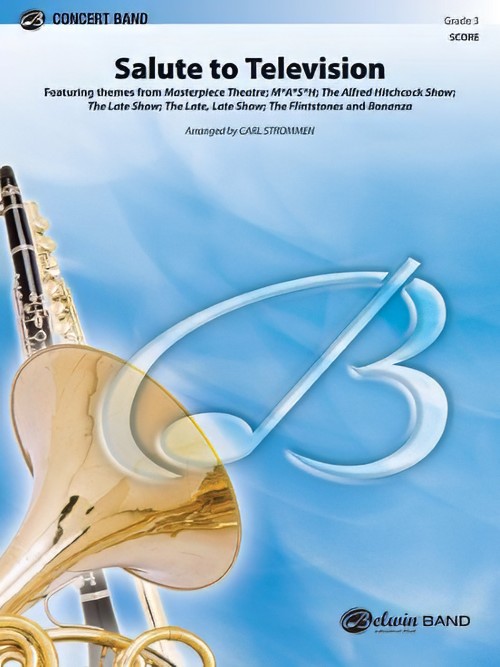 £75.00
£75.00Salute to Television (Concert Band - Score and Parts) - Strommen, Carl
This jam-packed medley containing the gems of television themes from yesteryear. Including themes from Masterpiece Theatre, M*A*S*H, The Alfred Hitchcock Show, The Late Show, The Late, Late Show, The Flintstones, and Bonanza, this is one yabba-dabba-delicious medley!Duration: 7.30
Estimated dispatch 7-14 working days
-
 £82.50
£82.50Kickstart - John Prescott
This driving, energetic, and exciting original work is the perfect vehicle to show off your percussion section. Solid scoring and comfortable ranges make this very accessible while making your developing band sound professional. Wind players have an excellent opportunity to reinforce articulations and dynamics, and the low brass will enjoy the opportunity to show off! A 3/4 section in the middle will give the band a fun exercise in rhythmic counting.
Estimated dispatch 7-14 working days
-
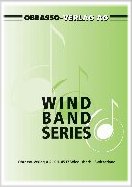 £101.50
£101.50BREEZIN' DOWN BROADWAY (Intermediate Band) - Richards, Goff
Includes: Another Openin', Another Show; There's No Business Like Show business; Get Me to the Church On Time (from My Fair Lady); Oklahoma; That's Entertainment; Seventy Six Trombones. Duration: 5:17 Grade: Medium
Estimated dispatch 7-14 working days
-
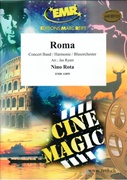 £152.00
£152.00ROMA (Advanced Concert Band) - Rota, Nino - Ryant, Jan
Movie: Roma (Aria Di Roma/Toby Dammit's Thoughts/Vitteloni's Bar/Ecclesiastical Fashion Show/Tobby Dammit at the TV Show) Duration:8:06 American Grade 4
Estimated dispatch 7-14 working days
-
 £104.50
£104.50Celebre - Robert E. Foster Jr.
Celebre is a lively show piece that explores a fun and frolicking melody, is complimented by a beautiful ballad section that can really show off the ensembles musicality, and concludes with an uptempo, energetic finale.
Estimated dispatch 7-14 working days
-
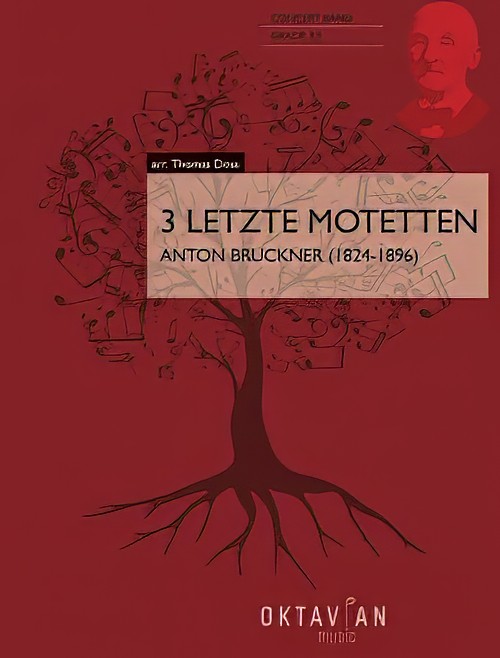 £123.20
£123.203 Letzte Motetten (Concert Band - Score and Parts) - Bruckner, Anton - Doss, Thomas
Anton Bruckner (b. 4.9.1824, Ansfelden, d. 11.10.1896, Vienna) didn't have it easy. Throughout his life, the Austrian composer was plagued by self-doubt. Anton Bruckner came from a simple, rural background. After the death of his father, he was accepted as a choirboy at the monastery of Sankt Florian in 1837. After several years as a school assistant and his own organ and piano studies, he first worked as organist in St. Florian, then from 1855 as cathedral organist in Linz. Introduced to music theory and instrumentation by Simon Sechter and Otto Kitzler, he discovered Richard Wagner as an artistic role model, whom he admired throughout his life and also visited several times in Bayreuth. In 1868 Anton Bruckner became professor of basso continuo, counterpoint and organ at the Vienna Conservatory; ten years later court organist; and in 1891 finally honorary doctor of the University of Vienna. He was considered an important organ virtuoso of his era, but had to wait a long time for recognition as a composer. It was not until Symphony No.7 in E major, composed between 1881 and 1883, with the famous Adagio written under the effects of Wagner's death, that he achieved the recognition he had hoped for, even if he was reluctant to accept it given his inclination towards scepticism and self-criticism. Anton Bruckner was a loner who did not want to follow a particular school or doctrine. He composed numerous sacred vocal works, such as his three masses, the Missa Solemnis in B flat minor (1854), the Te Deum (1881-84) and numerous motets. As a symphonic composer, he wrote a total of nine symphonies and many symphonic studies from 1863 onwards, tending to revise completed versions several times over. Bruckner's orchestral works were long considered unplayable, but in fact were merely exceptionally bold for the tonal language of their time, uniting traditions from Beethoven through Wagner to folk music, on the threshold between late Romanticism and Modernism. Anton Bruckner composed about 40 motets during his lifetime, the earliest a setting of Pange lingua around 1835, and the last, Vexilla regis, in 1892. Thomas Doss has compiled some of these motets in this volume for symphonic wind orchestra. These motets show many characteristics of personal expression, especially Bruckner's colourful harmony in the earlier works, which is in places aligned with Franz Schubert (changes between major and minor; and movements in thirds). Later works are characterised by many components which, in addition to the expanded stature of the movements, include above all a sense of the instrumentation as an outward phenomenon and the harmony as a compositional feature that works more internally. Some aspects of Bruckner's work are the result of his long period of study, which familiarised him not only with the tradition of his craft, but also gave him insights into the "modernity" of his time in such composers as Wagner, Liszt and Berlioz. From this developed his personal standpoint, which always pursues the connection between the old and the new.Duration: 14.00
Estimated dispatch 7-14 working days
-
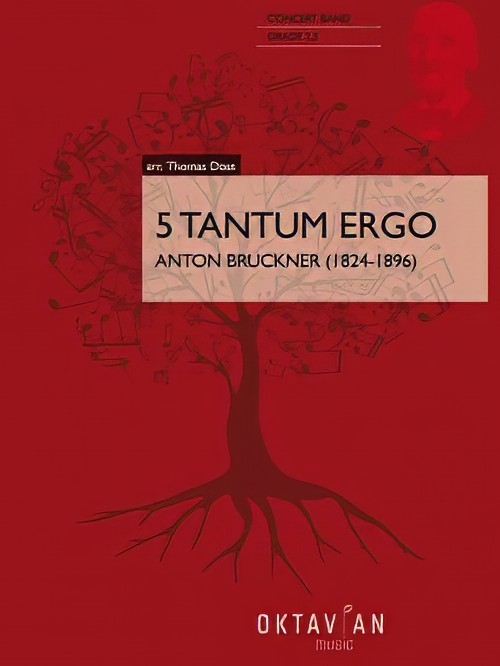 £95.99
£95.995 Tantum Ergo (Concert Band - Score and Parts) - Bruckner, Anton - Doss, Thomas
Anton Bruckner (b. 4.9.1824, Ansfelden, d. 11.10.1896, Vienna) didn't have it easy. Throughout his life, the Austrian composer was plagued by self-doubt. Anton Bruckner came from a simple, rural background. After the death of his father, he was accepted as a choirboy at the monastery of Sankt Florian in 1837. After several years as a school assistant and his own organ and piano studies, he first worked as organist in St. Florian, then from 1855 as cathedral organist in Linz. Introduced to music theory and instrumentation by Simon Sechter and Otto Kitzler, he discovered Richard Wagner as an artistic role model, whom he admired throughout his life and also visited several times in Bayreuth. In 1868 Anton Bruckner became professor of basso continuo, counterpoint and organ at the Vienna Conservatory; ten years later court organist; and in 1891 finally honorary doctor of the University of Vienna. He was considered an important organ virtuoso of his era, but had to wait a long time for recognition as a composer. It was not until Symphony No.7 in E major, composed between 1881 and 1883, with the famous Adagio written under the effects of Wagner's death, that he achieved the recognition he had hoped for, even if he was reluctant to accept it given his inclination towards scepticism and self-criticism. Anton Bruckner was a loner who did not want to follow a particular school or doctrine. He composed numerous sacred vocal works, such as his three masses, the Missa Solemnis in B flat minor (1854), the Te Deum (1881-84) and numerous motets. As a symphonic composer, he wrote a total of nine symphonies and many symphonic studies from 1863 onwards, tending to revise completed versions several times over. Bruckner's orchestral works were long considered unplayable, but in fact were merely exceptionally bold for the tonal language of their time, uniting traditions from Beethoven through Wagner to folk music, on the threshold between late Romanticism and Modernism. Hymns for four-part mixed choir a cappella (1846, St. Florian) No. 1 in E flat major (WAB 41/3): Quite Slow No. 2 in C major (WAB 41/4): Andante No. 3 in B flat major (WAB 41/1): Slow No. 4 in A flat major (WAB 41/2): Slow Hymn for five-part (SSATB) mixed choir and organ No. 5 in D major: Solemnly They are simple works, completely subordinate to their liturgical use, which nevertheless already show numerous characteristics of personal expression. These small pieces were able to stand up to the harsh scrutiny of the mature master: in 1888, Bruckner subjected them to a revision in which he made only minor corrections.Duration: 11.00
Estimated dispatch 7-14 working days
